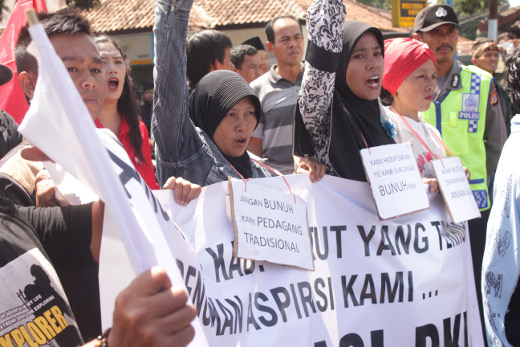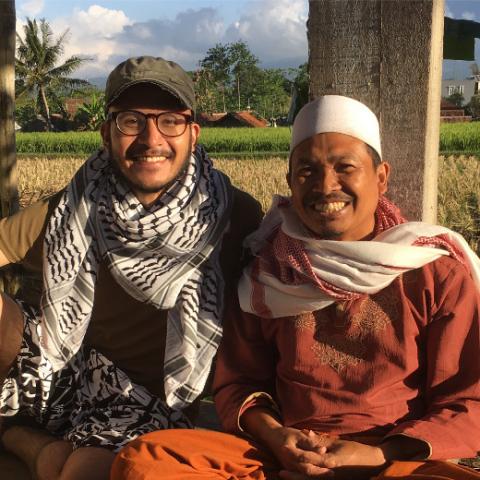 Indonesian scholastic Tiro Daenuwy SJ shares what he learnt from his immersion experience in an Islamic boarding house in Garut, West Java, Indonesia. The five-day immersion held from July 29 to August 2 is a vital part of the Asia Pacific Theological Encounter Programme, a formation programme in contextual theology with a focus on Islam that is conducted annually by the Jesuits in Indonesia. Part 1.
Indonesian scholastic Tiro Daenuwy SJ shares what he learnt from his immersion experience in an Islamic boarding house in Garut, West Java, Indonesia. The five-day immersion held from July 29 to August 2 is a vital part of the Asia Pacific Theological Encounter Programme, a formation programme in contextual theology with a focus on Islam that is conducted annually by the Jesuits in Indonesia. Part 1.
On the morning of the fourth day of our immersion at the Pesantren Ath-Thariq, I stepped on a rusty nail that was sticking out of a small block of wood where I was gathering hay from the paddy fields to make solid compost. A sharp pain shot straight from my right heel throughout my body. In grade school we were told that tetanus infections come from rusty nails and animal manure. Perfect!
I limped to find Abi Ibang, the head of the pesantren (Islamic boarding house). Abi means ‘my father’ in Arabic. I showed my wound to Abi like a sad child and Abi, being a resourceful man, immediately hacked several banana leaf stems and rubbed the open ends on my wound to clean and disinfect it. Then, with the hilt of his axe, he tapped both sides of the wound to push out contaminated blood and continued to clean it with the stem. He went away briefly, and returned with a handful of plants called pegagan, that look like mini lily pads. He told me to chew them and apply the paste to my wound. While I waited for my wound to heal, Umi Nissa brought fried cassava and a ruby-red rosella drink for us 19 seminarians and three priests learning to create organic compost.
 Once my wound closed up, I was back in the paddy fields gathering more hay for the compost. Abi left to join a demonstration at the Regent’s office of Garut and help voice the opinions of farmers who feel that the government has not done much to protect their rights.
Once my wound closed up, I was back in the paddy fields gathering more hay for the compost. Abi left to join a demonstration at the Regent’s office of Garut and help voice the opinions of farmers who feel that the government has not done much to protect their rights.
There are strong links between religious fundamentalism, poverty and environmental destruction in Indonesia. Many of the young men, including the Bali bombers of 2009, are from West Java. The Green Revolution in the 90s brought about large-scale farming, which changed the agricultural landscape and made small-scale farming more and more unattractive to the youth. The once pristine paddy fields and forests are slowly transforming into factories, housing compounds, plantations and mines. The youth now tend to urbanise and when they do not have the requirements to get a decent job, they become unemployable.
Abi and Umi are highly aware of this problem. Their response to the damage of the Green Revolution was to establish a pesantren that would form agro-ecological cadres who are spiritually, physically and mentally balanced. They named the pesantren, Ath-Thariq, meaning ‘the way’ in Arabic. Since they opened Ath-Thariq in 2009, they have produced more than 700 alumni throughout Indonesia. Their actions are based on the Islamic belief that humankind are caretakers of the Earth. Their way of expressing their love for God’s creation is to respect nature.
 Our presence there was welcomed with enthusiasm and generosity. Never would I have expected that in just five days, we would learn so much from our Muslim brothers and sisters, and all related directly to the three main issues the Indonesian Province of the Society of Jesus has made its priorities: religious fundamentalism, environmental destruction and poverty.
Our presence there was welcomed with enthusiasm and generosity. Never would I have expected that in just five days, we would learn so much from our Muslim brothers and sisters, and all related directly to the three main issues the Indonesian Province of the Society of Jesus has made its priorities: religious fundamentalism, environmental destruction and poverty.
Indonesia is struggling to fight against religion-themed violence towards non-Muslim minorities and even to Muslim minority sects, such as the Ahmadis and the Shiites. With 250 million people, Indonesia is the fourth most populated country in the world. The majority of the people are Muslims, making it the largest Muslim population in the world. The violence is perpetrated and promoted by a small yet vocal group.
During our 10-day peregrination experiment as novices, our Muslim hosts treated us very kindly as guests. One village chief even offered us his room to sleep in.
Living at Ath-Thariq made me realise even more the importance of how I must advocate religious tolerance online and offline. If only more people would share their stories of religious tolerance, perhaps we could make it the norm rather than a trending issue.
Related Story: The simple life as a symbol of resistance

